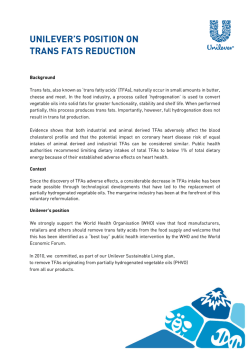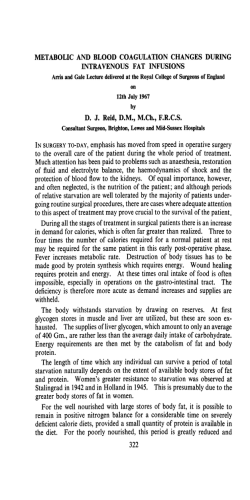
section - Arbor Farms Market
ARBOR FARMS MARKET 2103 West Stadium - Boulevard Plaza Ann Arbor - 734-996-8111 - arborfarms.com Our February 2015 Newsletter for Healthy Living A Healthy Heart Needs Healthy Fats nother nail has been driven into the coffin of the low-fat diet. Three articles have recently appeared in prominent medical journals elucidating the fallacy of the saturated fat myth. For nearly four decades, Americans have been urged to replace dietary saturated fats with carbohydrates and omega-6 polyunsaturated fats in order to improve their metabolic profile and lower cardiovascular risk. Yet scientific evidence clearly shows that this advice has raised your heart attack risk, as well as your chance of developing a number of other life-threatening chronic diseases. Studies have consistently failed to support any significant association between saturated fat intake and cardiovascular risk. In fact, saturated fat has been found to be cardioprotective if you are consuming the right kind. A recent scientific review published in the British Medical Journal about what is known to date about saturated fat intake and heart disease explained how recent studies have not supported any significant association between saturated fat and cardiovascular risk. The authors report that two-thirds of people admitted to hospitals with acute myocardial infarction have completely normal cholesterol levels. The report also mentions a recently published randomly controlled trial that was stopped early after it showed that, in high risk people, the Mediterranean diet achieved a 30 percent improvement over a low-fat diet in terms of cardiovascular events. The au- A thors conclude: "The greatest improvements in morbidity and mortality have been due not to personal responsibility but rather to public health. It is time to bust the myth of the role of saturated fat in heart disease and wind back the harms of dietary advice that have contributed to obesity." These findings were further crystallized by an international research LDL; impaired glucose tolerance, higher body fat, weight gain, obesity, and diabetes; increased small, high-density LDL particles. One of the primary problems with all oils derived from vegetable seeds is that they are major sources of omega-6 fats. Omega-6 fats are proinflammatory and contribute to insulinand leptin-resistance, altering mood and impairing learning and cell repair. “It is time to bust the myth of the role of saturated fat in heart disease…” team headed by University of Cambridge, which analyzed data from 72 separate studies about heart risk and fatty acid intake. This massive metaanalysis included data from 600,000 participants in 18 different countries. The team concluded that saturated fat is NOT linked to coronary disease risk. They pointedly state that the science does not support the common nutritional guidelines for heart health—that a diet rich in polyunsaturated fats but low in saturated fats will reduce your risk for heart disease. Another recent paper published in the journal Open Heart reviewed the cardiometabolic consequences of replacing saturated fats with carbohydrates and omega-6 polyunsaturated fats. The potential harms of replacing saturated fat with carbohydrates were summarized as the following: a shift to overall atherogenic lipid profile (lower HDL, increased triglycerides and increased ApoB/ApoA-1 ratio); increased oxidized The science is loud and clear: the correct balance of omega-3 to omega-6 fats is essential if you want to be the healthiest you can be. Omega-3 fats are the ones that are present in fish and krill oil and some seeds like flax, chia, and hemp. These are the essential fats that have EPA, DHA, and ALA fats that are present in your brain and cell membranes. Omega-6s are oils that are high in other plants like corn, soy, safflower, and sunflower oils. All of these oils are required to be healthy, but largely due to overconsumption of processed foods high in industrialized oils, we are consuming far too many omega-6 fats compared to omega-3 fats. The ideal ratio of omega-3 to omega-6 fats likely ranges from 1:1 to 1:5, but the typical Western diet is between 1:20 and 1:50. The benefits of omega-3 fats are truly far-reaching. The omega-3 fat page on GreenMedInfo.com lists a series What’s Inside This Issue Fast Food and Child IQ Time for Chocolate Organic Produce CSA Farm Shares February Monthly Coupon All articles in this newsletter are for the purpose of nutritional information only and should not be considered a substitute for professional medical advice. continued on page 2 Fast Foods and Child IQ utrients from quality foods are critical in helping your child reach his or her fullest potential. Unfortunately, many kids are not getting the nutrients they need, especially in the US where nearly 40 percent of children's diets come from added sugars and unhealthy fats. Only 21 percent of youth aged 6-19 eat the recommended five or N ety of allergies, inflammatory conditions and autoimmune diseases. In fact, most of the leading diseases plaguing the US are diet-related. Even the conservative National Institutes of Health (NIH) admits that four of the six leading causes of death in the US are linked to unhealthy diets. Whether or not your child is putting on excess weight, it’s impor- “...frequent fast food consumption may stunt your child’s academic performance.” more servings of fruits and vegetables each day. This is a recipe for chronic poor health, and is a primary reason why many of today's kids are arguably heavier and more disease-ridden than previous generations. As of 2011, over 17 percent of American children between the ages of two and 19 were obese, and nearly six percent of youths met criteria for class 2 obesity, classified as having a BMI greater than 120 percent of the 95th percentile (or a BMI of 35). More than two percent of children fell in the class 3 obesity category, indicating they had a BMI of 40 or greater. Such extreme obesity during youth can really set you up for a lifetime of very serious health problems. Diseases that once appeared only in middle-age and beyond, including type 2 diabetes, high blood pressure, and even liver disease are now prevalent among our youth. A junk-food diet can also set the stage for asthma, eczema, and a vari- tant to consider what a steady diet of processed food might do to his or her health—and IQ... One British study revealed that kids who ate a predominantly processed food diet at age three had lower IQ scores at age 8.5. For each measured increase in processed foods, participants had a 1.67-point decrease in IQ. More recently, research published in the journal Clinical Pediatrics warns that frequent fast food consumption may stunt your child’s academic performance. A total of 11,740 students were included in the study. All were tested in math, reading, and science while in fifth and eighth grade. As fifth-graders, they also completed a food survey. More than half reported eating fast food between one and three times per week; 10 percent ate it four to six times a week, and another 10 percent reported eating fast food daily. As reported by PBS News: “Children who reported eating fastfood four times a week or more in the fifth grade showed lower test score gains in the eighth grade in all three subject areas by up to 20 percent. Children who reported eating fast food just one to three times a week still lagged behind their non-fast food eating peers in one subject–math.” While the study cannot prove causation, the results remained the same even when the researchers controlled for confounding factors such as the school quality, socioeconomic status, exercise frequency, and amount of television viewing. Parents would certainly be well advised to pay heed, as you do not need to be a rocket scientist to realize that poor nutrition will ultimately have an adverse effect on performance—both physical and mental. Nutritional deficiencies early on in life can also lead to deficits in brain function that puts a child at risk of behavioral problems -from hyperactivity to aggression -- that can last into the teenage years and beyond. According to the lead author: “There’s a lot of evidence that fast food consumption is linked to childhood obesity, but the problems don’t end there. Relying too much on fast food could hurt how well children do in the classroom... We’re not saying that parents should never feed their children fast food, but these results suggest fast food consumption should be limited as much as possible.” Reference: Prevention Institute. JAMA Pediatrics 7 April 2014. Clinical Pediatrics 5 Dec. 2014. PBS Dec. 22, 2014. Healthy Heart, continued from page 1 of scientific studies supporting the benefits of omega-3 fats for hundreds of diseases, including drug-resistant cancer, bipolar disorder, autism, cystic fibrosis, hypertension, and atrial fibrillation—and those are just the tip of the iceberg. Omega-3 fats have powerful antiinflammatory effects, proving extremely beneficial for inflammation-based disorders such as arthritis and bronchial asthma. Chronic inflammation is a major driver of many of the diseases prevalent today, and omega-3 deficiency is a significant factor. Omega-3 deficiencies are associated with the following (which is far from an all-inclusive list): inflammatory conditions: arthritis, stiff or painful joints, asthma, etc; cognitive and emotional problems: depression, psycho- sis, learning disabilities, memory loss, poor concentration, etc.; metabolic dysfunction: weight gain, obesity, diabetes, food cravings; skin problems: allergies, acne, eczema, psoriasis, hives; dry, bumpy or flaky skin; heart or kidney problems, high blood pressure, or immune dysregulation. The best way to improve your omega-3 to omega-6 ratio and improve your heart health is to eat the following types of high-quality foods: unprocessed organic oils such as extra virgin olive oil, coconut oil, avocados and avocado oil, and organic butter from grasspastured cows; raw nuts and seeds, such as fresh organic flax seeds, chia seeds, sunflower seeds, sesame seeds, pumpkin seeds, almonds, and English walnuts, which are also high in omega-3s (ALA); spirulina, an excellent source of GLA (gamma linolenic acid, a beneficial omega-6); meat from animals that are free-ranging and/or grass-fed, which are higher in beneficial omega-6s, such as natural CLA; the omega-3 fat supplement is krill oil; egg yolks from pastured hens; and coconut oil. While not an omega-3 or omega-6 fat, coconut oil is an extremely beneficial dietary fat with an "embarrassment of riches" for your heart, metabolism, immune system, skin and thyroid. Coconut oil's health benefits derive from its special medium-chain fatty acids. Reference: British Medical Journal October 2013; Medical News Today March 18, 2014; Open Heart March 5, 2014. GreenMedInfo.com June 7, 2012. The Season for Chocolate nacking on chocolate may be one delectable way to boost your health, provided you choose the right type of chocolate. Certain types of chocolate, as well as cocoa powder and cacao, rank right up there among the S bioactivities of the flavanols in cocoa, particularly at the low doses employed for the present study.” Research presented at the 247th National Meeting & Exposition of the American Chemical Society (ACS) re- “The regular consumption of chocolate is associated with leanness in adults and lower body fat in teens.” most anti-inflammatory and antioxidantrich foods known to mankind. It’s the antioxidant flavanols that are responsible for much of the health benefits, and recent research set out to determine which flavanols, in particular, may prevent certain health conditions, including type 2 diabetes and obesity. Consuming high levels of flavanols found in foods like chocolate is linked to reduced insulin resistance and improved glucose regulation, which suggests it may be protective against type 2 diabetes. Past research has also found that the regular consumption of chocolate is associated with leanness in adults and lower levels of body fat in teens. Chocolate varies greatly in the different types of flavanols it contains, so researchers wanted to find out whether different cocoa flavanols were more beneficial than others. For instance, both fermentation and processing of cocoa beans influences the final outcome of flavanols in the cocoa (cocoa refers to the powder made from roasted, husked, and ground cacao, or cocoa, seeds, from which most of the fat has been removed). The researchers supplemented a high-fat diet for mice with monomeric, oligomeric, or polymeric procyanidins (PCs), which are different types of flavanols. It turned out that oligomeric PCs were the most effective at both maintaining weight and improving glucose tolerance in the mice. Even more intriguing, the doses of flavanols used in the study were significantly lower than those used in past research, which suggests it may be more feasible to obtain health benefits from eating chocolate than was previously thought. The researchers noted: “The oligomer-rich fraction proved to be most effective in preventing weight gain, fat mass, impaired glucose tolerance, and insulin resistance in this model… Oligomeric PCs appear to possess the greatest antiobesity and antidiabetic vealed a unique connection between the microbes in your gut and the health benefits of chocolate. While cocoa powder is rich in antioxidants including catechin and epicatechin, along with a small amount of fiber, it was thought that these molecules were poorly digested and absorbed due to their large size. The new study found, however, that your gut bacteria break down and ferment the components in dark chocolate, turning them into anti-inflammatory compounds that benefit your health. In particular, beneficial microbes including Bifidobacterium and lactic acid bacteria “feasted” on chocolate, according to the researchers. The study, which involved three cocoa powders tested in a model digestive tract, may help explain why chocolate has been found to be so good for your heart, as the anti-inflammatory compounds may reduce inflammation of cardiovascular tissue. The study’s lead author explained: “In our study we found that the fiber is fermented and the large polyphenolic polymers are metabolized to smaller molecules, which are more easily absorbed. These smaller polymers exhibit anti-inflammatory activity… When these compounds are absorbed by the body, they lessen the inflammation of cardiovascular tissue, reducing the long-term risk of stroke.” The researchers suggested that consuming cocoa along with prebiotics may be one way to encourage the conversion of polyphenols into highly absorbable anti-inflammatory compounds in your stomach. Prebiotics are carbohydrates found in whole foods that you can’t digest… but which beneficial bacteria can, acting as “food” for them. Unprocessed whole foods, such as onions and garlic, are among the best prebiotics, so if you’re eating right, you should be getting plenty of prebiotics. It would seem that taking steps to encourage healthful gut bacteria, in general, would also ensure that you have enough beneficial bacteria available to help break down and ferment the healthy substances in cocoa. This includes avoiding sugar and grains, as well as eating naturally fermented foods and/or taking a high-quality probiotic supplement. One of the major results of eating a healthy diet is that you cause your beneficial gut bacteria to flourish, and they secondarily perform the real "magic" of restoring your health. Michigan Grass-fed Beef: Humanely-raised at Lamb Farm in Manchester, MI Porterhouse & T-Bone Steaks only $12.99/lb Interestingly, the researchers also suggested consuming dark chocolate with antioxidant-rich solid fruits, such as pomegranate or acai, as another way to boost its health potential. The closer your cocoa is to its natural raw state, the higher its nutritional value. The closer your cocoa is to its natural raw state, the higher its nutritional value. Ideally, your chocolate or cocoa should be consumed raw (cacao). When selecting chocolate, you can optimize its nutritional punch by looking for higher cacao and lower sugar content. In general, the darker the chocolate, the higher the cacao. However, cacao is fairly bitter, so the higher the percentage cacao, the more bitter it is. To counteract the bitterness, most chocolate is sweetened, so it's a matter of balancing nutritional benefit with palatability Choose chocolate with a cocoa/cacao percentage of about 70 or higher. If you can tolerate the flavor of raw cacao, however, then that's the absolute best option. Dark chocolate – as high in cacao and as bitter as you can stand -- is your best option. Reference: Journal of Agriculture and Food Chemistry March 12, 2014. Medical News Today April 3, 2014. Journal of Nutrition February 1, 2014. Archives of Internal Medicine 2012 March 26: 172(6):519-21. Nutrition 2014 Feb; 30(2):236-9. ARBOR FARMS MARKET PRSRT STD US POSTAGE PAID ANN ARBOR MI PERMIT NO 150 2103 West Stadium - Boulevard Plaza Ann Arbor - 734-996-8111 - arborfarms.com $2 OFF your next purchase of $15 or more at Arbor Farms Market. Limit one coupon per visit. No cash value. Valid through 2/28/2015 February Specials Effective February 2 through February 15, 2015 Subscribe today! Organic Broccoli…….………….....……..... $1.99/lb Organic Russet Potatoes, 5-lb. bag......……......... $3.99 Grass-fed Rib-Eye Steaks, Bone-in……….… $12.99/lb Miller Amish Pick of the Chick…….…....... $1.89/lb Organic Steelhead Trout Fillets Farm Canada $13.99/lb Michigan Grass-fed T-Bone Steaks Porterhs $12.99/lb Organic Grape Tomatoes, pint pkg.....……......... $2.99 Organic Cauliflower…….……..........…...... $2.99/lb Organic Green Beans................................... $2.99/lb . . Organic Produce CSA Homer Organic Family Farms Sign up & pick-up at Arbor Farms Information for 2015 season is now available in-store, or visit www.arborfarms.com & . Effective February 2 through March 1, 2015 Benefits of Community Supported Agriculture Nature’s Path Hot Cereals, asstd. 11-14 oz……….... 2/$6 Natural Seas Albacore Tuna, 5 oz………..…..... 2/$6 Endangered Chocolate Bars, assorted 3 oz……..… 2/$4 Ultra-Fresh Organic Produce– the best of the best! Amadieu Cotes-du-Rhone 750 ml Rouge……........ $9.99 ABC Sacred Cow I.P.A. & assorted 6/12 oz….....… $9.49 Saves time and money. You really know where your food is coming from. Jarrow Dietary Supplements, entire line….. 20% OFF Natren Probiotics, entire line………...…...... 20% OFF Supports local economy and local agriculture. Derma-E Skin Care, entire line…………..... 20% OFF Learn about new foods and seasonality. Herb Pharm Herb Tinctures… 20% OFF entire line!
© Copyright 2026








